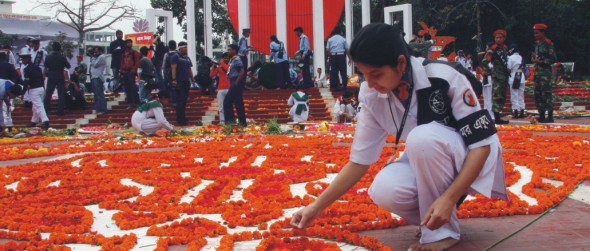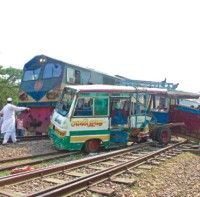Letters
Celebrating Our Mother Tongue

The mother tongue of the people of Bangladesh is Bangla. It has a glorious history of the language movement that took place on February 21, 1952. We are the only nation who shed their blood for their language, to recognise Bangla as a state language. The UNESCO has recognised 21st February as the International Mother Language Day. It is observed every year all over the world. But it is an irony of fate that Bangla has not yet been introduced at all levels as the state language. 21st February has now become an occasion to celebrate. Nowadays, on 21st February we decorate the Shaheed Minar with colorful flowers, but we do not do it to mourn the sacrifice of the martyrs who lost their lives. There are no authorities to look after our central Shaheed Minar from where the language movement originated. The prominent Amtola (mango tree) before Dhaka Medical College Hospital (DMCH) has not been preserved by the state authority. Now this place is a meeting ground for the drug abusers and the tea sellers. Is this not a shame for the Bangladeshi people?
Md Hafizur Rahman
Department of Law
University of Dhaka
Enhance Rickshaw's Status
The importance of rickshaws as our traditional and cultural heritage has once again been upheld at the ICC World Cup Cricket gala opening ceremony at Bangabandhu National Stadium where the 14 captains of the participating teams in the sporting event entered on these brightly lit vehicles. The rickshaws are an integral part of our daily lives and are environmentally friendly as well. The concept of carrying 14 captains on rickshaw was truly brilliant and I would like to thank the organisers for implementing it so well. I would urge the concerned authorities to do the needful for retaining rickshaws on the streets of Dhaka, thereby reducing the use of environment polluting, carbon contributing gas driven vehicles.
Mohammed Jashim Uddin
Bangladesh Sangbad Sangstha
Dhaka
World Wetland
Day 2011
The decline of wetland area has become a burning issue not only in Bangladesh but also all over the world and is considered a major environmental degradation. According to bwbd.gov.bd: “Degradation of wetlands has caused several problems including extinction and reduction of wildlife, extinction of many indigenous wild and domesticated rice varieties, loss of many indigenous aquatic plants, herbs, shrubs and weeds, loss of natural soil nutrients, loss of natural water reservoirs and of their resultant benefits, increase in the occurrence of flooding and degeneration of wetland based ecosystems, occupations, socio-economic institutions and cultures.” In this situation the world wetland day was observed all over the world on February 2, 2011. It marked the date of the adoption of the Convention on Wetlands on 2 February 1971, in the Iranian city of Ramsar. The international theme for World Wetlands Day 2011 was "wetlands and forests - forests for water and wetlands". One of the reason for this is 2011 is the UN International Year of Forests. Like many other countries the day was also observed in Bangladesh.
But what is our scenario? At present only 6 percent of the total landmass of the country is covered by forests and still declining while the optimum requirement is 25 percent! We all know that Bangladesh is a country of wetlands and we posses enormous areas of wetland including rivers and streams, freshwater lakes and marshes like Haors, Baors, Beels etc. We have two Ramsar sites (wetland of international importance) in our country that is the Sundarban reserve forest and Tanguar Haor. These wetlands directly and indirectly influence the life of Bangladeshi people. Wetlands are critically important in Bangladesh for human settlements, biodiversity, fisheries, agricultural diversity, navigation & communication, and ecotourism.
There are so many talks about the importance of the preservation of wetland but do we really want to preserve these wetlands? When the environmentally aware people all over the world were preparing to observe World Wetland Day 2011, the people of Arial beel (which is an important wetland of the country) had to fight for retaining their land and the LAND TERRORISTS (vumi doshhu) are trying to foil the Detailed Area Plan (DAP)!
At present 12 spots have been declared as the ecologically critical areas (ECAs) by Department of Environment (DoE) in our country and interestingly most of them are wetlands including the river Buriganga, Shitalakha, Balu and Turag, Gulshan Lake, Tanguar Haor, Hakaluki Haor, Marjut Baor.
According to USAID Bangladesh, 50 percent of its freshwater wetlands are lost or degraded and more than 50 percent of seasonal and perennial wetlands have been affected by growing unplanned urban and agricultural land use. Because of enormous importance, the sustainable management and conservation of wetland are very important for an environmentally vulnerable and limited resource containing country like Bangladesh.
If we want the sustainable management and conservation of wetland then we have to create awareness among people. Observing World Wetland Day will certainly help us to create awareness among people. But if we confine the observation in the air-conditioned room of 5star hotel by arranging seminar, symposium etc. only then it will yield nothing. I think the involvement of the students of schools, colleges and universities are very important for observing such occasion like World Environment Day, World Water Day and World Wetland Day etc.
Md Readul Ahsan Nipu
University of Dhaka
On Accidents
 Recently in Bangladesh, 13 people were killed by train accidents. In different parts of the country, a few horrible train and bus crashes happened in the past year. The first accident happened in Comilla when a Suborno Express train rammed into a passenger bus, and 8 people were killed. The second incident took place in Jessore when another inter-city train rammed into a bus at a railway crossing, killing five people and injuring 15 others. The Bangladesh Railways authorities suspended the railway gatekeeper in Jessore immediately after the incident and formed two separate committees to investigate the accidents and submit the reports within two days, which was a good step on their part. We hope our government and concerned authorities will take proper steps to stop train accidents in the future.
Recently in Bangladesh, 13 people were killed by train accidents. In different parts of the country, a few horrible train and bus crashes happened in the past year. The first accident happened in Comilla when a Suborno Express train rammed into a passenger bus, and 8 people were killed. The second incident took place in Jessore when another inter-city train rammed into a bus at a railway crossing, killing five people and injuring 15 others. The Bangladesh Railways authorities suspended the railway gatekeeper in Jessore immediately after the incident and formed two separate committees to investigate the accidents and submit the reports within two days, which was a good step on their part. We hope our government and concerned authorities will take proper steps to stop train accidents in the future.
Rowshan Ali
Dhanmondi, Dhaka
Submission Guideline:
Letters to the Editor, Star Diary and Write to Mita, with the writer's name and address, should be within 200 words. All articles should be within 1,200 words. A cover letter is not necessary, but every write-up should include the writer's name, phone number and email address (if any). While The Star welcomes unsolicited articles and photographs, it cannot accept the responsibility of their loss or damage. The Star does not return unsolicited articles and photos. Response time for unsolicited write-ups ranges from three weeks to two months. All articles submitted are subject to editing for reasons of space and clarity.
All materials should be sent to: The Star magazine, 64-65, Kazi Nazrul Islam Avenue, Dhaka-1215, Fax: 880-2-8125155 or emailed to: <thestarmagazine@gmail.com>
It is recommended that those submitting work for the first time to The Star take a look at a sample copy beforehand. Our website is: http://www.thedailystar.net/magazine
Copyright (R) thedailystar.net 2010
